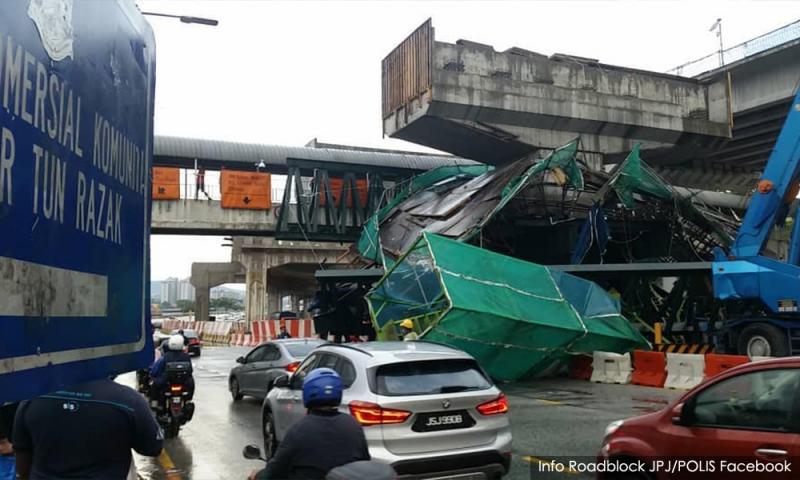LETTER | Safety first in policy but safety last in practice
LETTER | The frequent accidents on the roads - the Suke crash being the latest - due to construction activities mainly in Selangor and Kuala Lumpur, where almost all major roads face construction activities such as the MRT, LRT, elevated highways, new highways and road widening projects need to be addressed seriously.
As if all these are not enough, the utility companies too join the fray with their constant digging and trenching making it dangerous and inconvenient for road users. Heavy machinery for piling, launching, excavating and other works increase the risk on the roads. The streetscape of Kuala Lumpur and some urban areas in Selangor has changed and mostly becomes defaced with all these large structures.
In most cases, the contractors, the JKR, Works Ministry, the Department Of Occupational Safety And Health and the Malaysian Highway Authority are to blame as due importance to safety and SOPs are not followed due to lax supervision and penalties.
For example if a 10 km road widening or upgrading project starts, the entire stretch is dug up here and there and this causes maximum danger and inconvenience to road users. The contractors can do part by part finishing the work on a short stretch and moving to the next. This is regrettably not done and the road users will have to bear with various difficulties until the project is completed possibly after a few years.
Sometimes road projects are abandoned due to various reasons adding to the problems for road users. The problems between main contractors and sub-contractors can cause delay and even abandonment of work, and in Malaysia this has become common due to policy reasons. Main contractors immediately pass off projects to others as soon as they have won the tender and the delay in progressive payments is a major cause for either slow or no work until payments are received.
The government or the banks that are financing the projects must ensure quick progress payments to ensure that the project can be completed according to the deadline. Progress payments can be delayed for various reasons. The loan providers may expect inducement and kickbacks, and graft is part and parcel of this inter-connected process.
For road projects, only resourceful companies with a proven record should be selected as work must be implemented and completed quickly, if possible before the deadline. Even simple road widening projects take years to complete and it is time the Works Ministry looked into the causes and take remedial action.
Contractors don't care much for safety if there are no complaints from road users. As soon as the project starts, the first' casualty' is the streetlights which are switched off due to the cables being severed as a result of excavations here and there. No effort is made to connect the cables overhead temporarily to ensure the lights function again and provide safety at night.
Poor maintenance, potholes, erased lane markings , water ponding, uncovered manholes, the road shoulder grass and low tree branches not being cut or trimmed during the project period, missing signboards, barricades and traffic cones being placed too close and restricting traffic, detours , U-turns , traffic diversion and congestion all become the bane of motorists during the duration of the project.
Upgrading of bridges, resulting in bridges being elevated higher, without grading the road is dangerous as trailers and container trucks experience a bump when crossing the bridge. This could result in containers or trailers becoming unhooked from the prime mover and it could lead to accidents. A good example of this is Jalan Langat connecting Klang and Banting.
Roads are not regularly resurfaced as before due to high cost possibly resulting from graft. Due to this, many roads are rough, potholed and worn out and lane markings have faded out. The new group of road resurfacing workers, mainly from India, are not mindful of the danger and risks of their shoddy work at re-surfacing. The road edges are not sloped or graded and one finds the road level having increased by six inches or more making it difficult to cross and becoming accident-prone.
The previous generation of Malaysian Indian workers who did the road works was more safety conscious and worked under strict supervision of the JKR. Some newly resurfaced stretches are stone-bare and not properly steam-rolled leading to potholes within a short time. All these happen mainly due to poor supervision and corruption by the authorities.
It is time road safety is given priority by the contractors and the government authorities to reduce casualties and they need to explore ways and means to reduce the risk and danger to road users during the construction stage. A progressive penalty scheme should be implemented against recalcitrant contractors.
Complaints by the public should also be given weight under this scheme. Stop-work orders appear not to be effective enough as the burden is mostly borne by the workers and not the senior management.
Soon there will be the annual 'Ops Selamat' for Hari Raya Aidil Fitri but traffic accidents, death and injuries could keep mounting and a good case was in 2019 when Selangor recorded the highest number of casualties and this was mainly due to all the major roads in Selangor undergoing upgrading, repairs and other construction activites that endangered road safety.
The state government and local authorities should penalise errant and inefficient contractors and not leave it only to the JKR or the Works Ministry to take action.
The views expressed here are those of the author/contributor and do not necessarily represent the views of Malaysiakini.
RM12.50 / month
- Unlimited access to award-winning journalism
- Comment and share your opinions on all our articles
- Gift interesting stories to your friends
- Tax deductable
